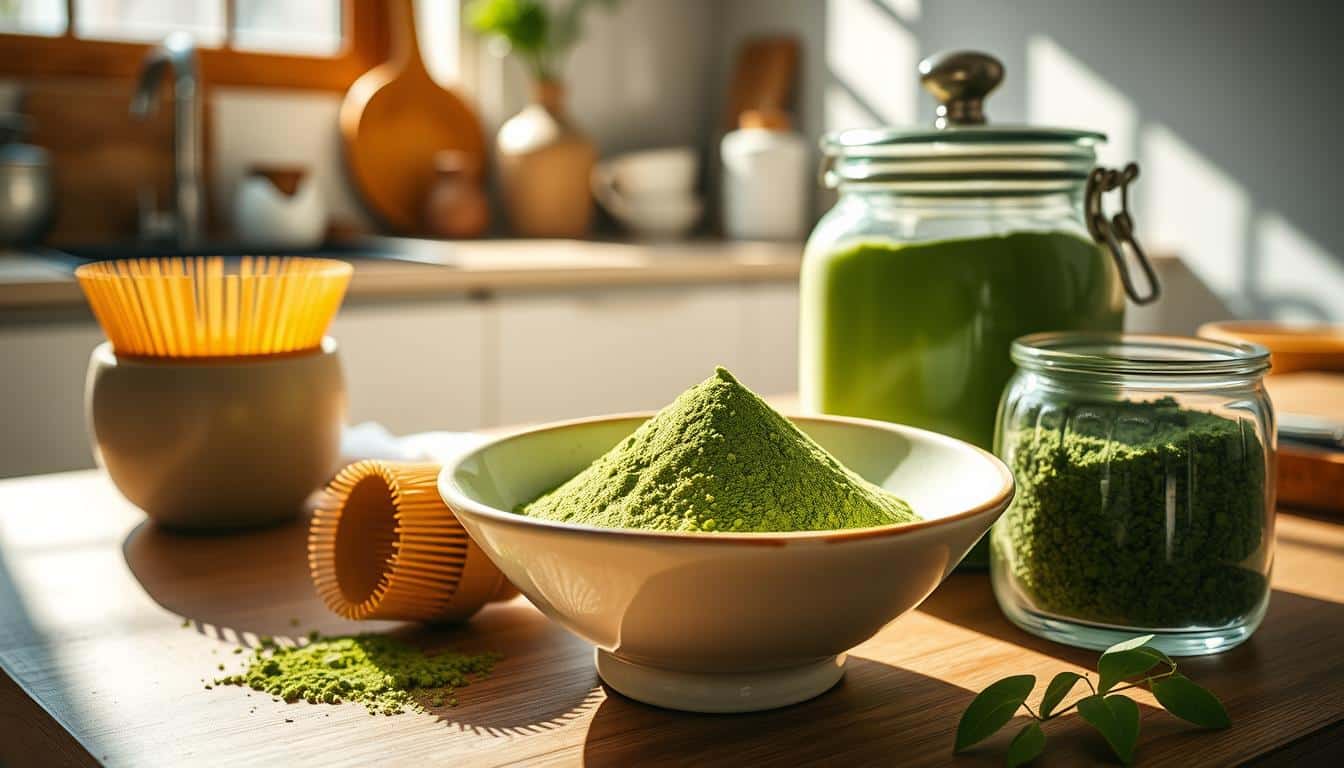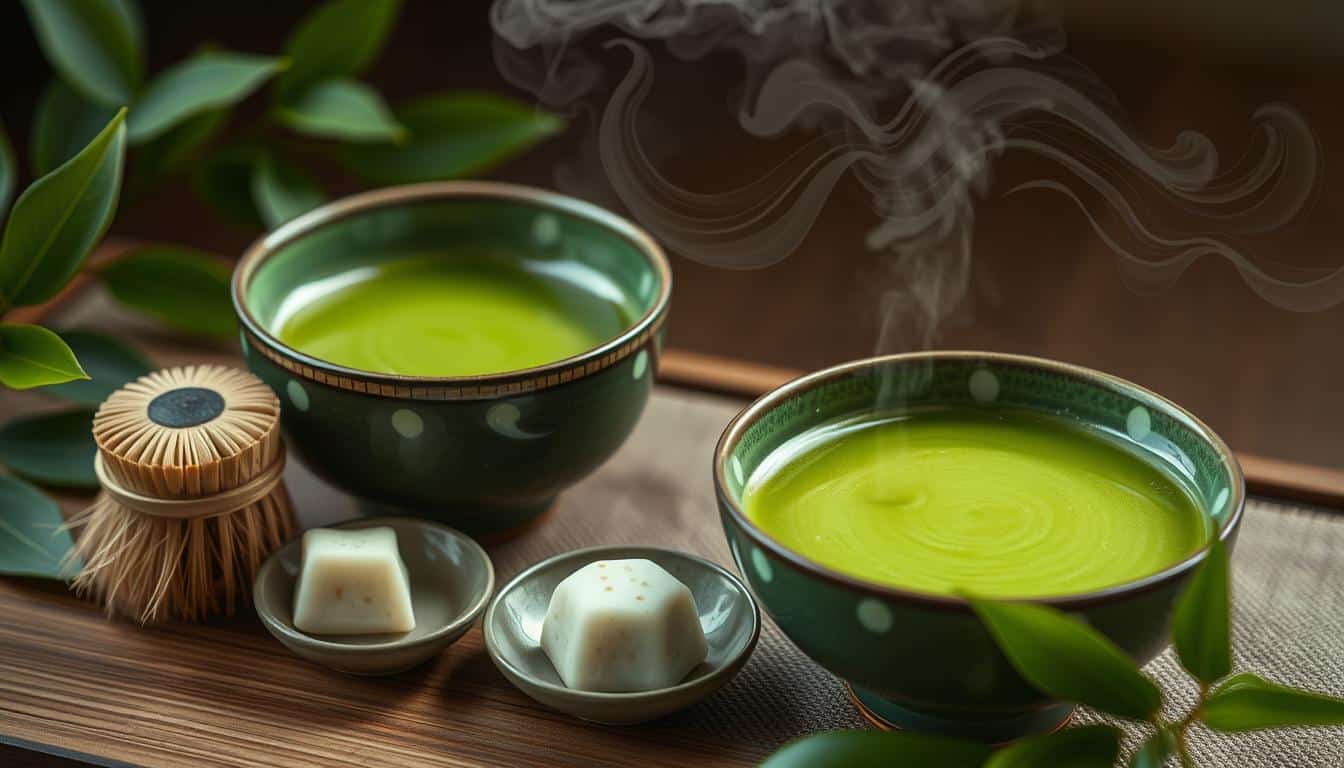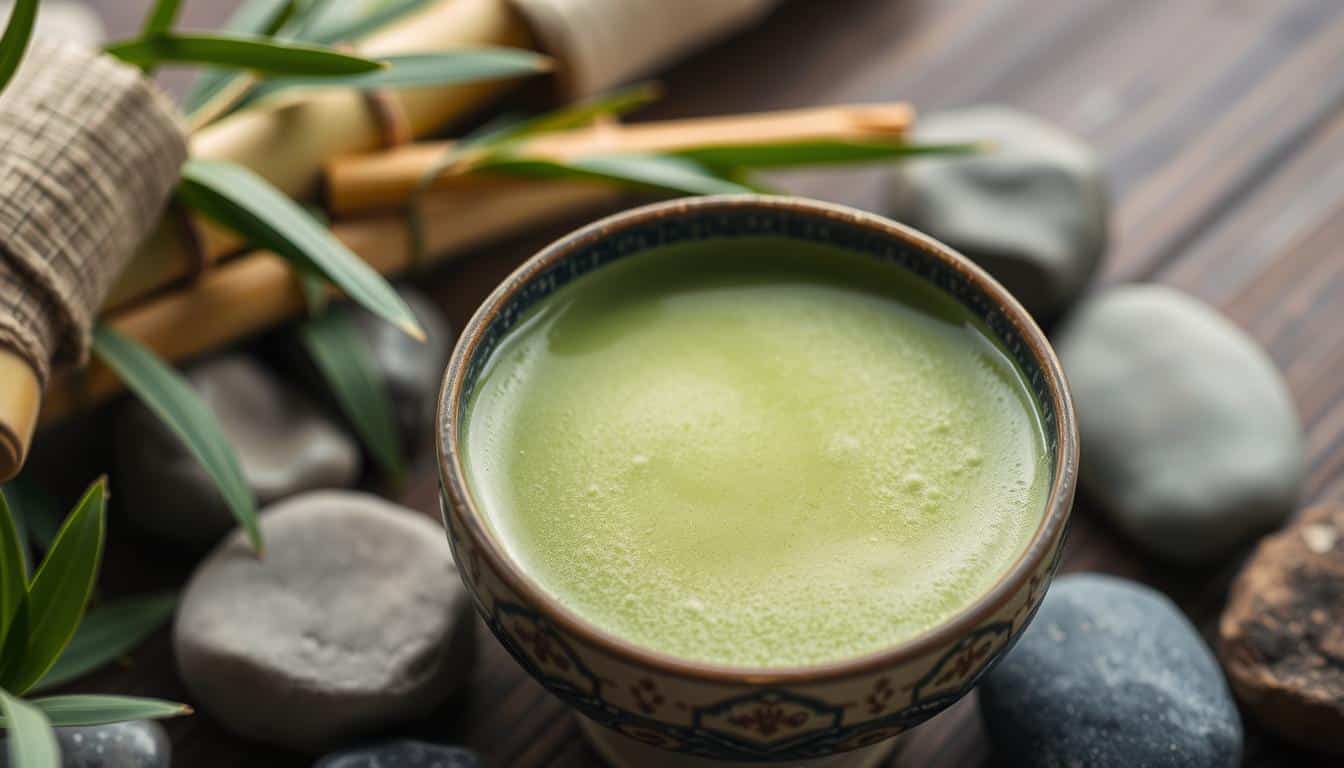Did you know coffee is quite acidic, with a pH between 4.5 and 5? But matcha tea is only a bit acidic, with a pH of 5.5 to 7.0. This shows why health experts love matcha. We’ll look into matcha’s acidity, its pH levels, and its health perks.
Ever wonder what makes matcha acidic or alkaline? The pH scale goes from 0 to 14. Substances below 7 are acidic, and those above 7 are alkaline. Knowing where matcha stands on this scale helps us see its health benefits.
Drinks like matcha affect your health, like fighting acid reflux or protecting teeth. We’ll see how matcha, though a bit acidic, can balance your body’s pH levels.
Key Takeaways
- The pH scale ranges from 0 to 14; matcha tea sits around 5.5 to 7.0.
- Coffee is more acidic than matcha with a pH of 4.5 to 5.
- Matcha is minimally acidic and can help balance the body’s pH levels when metabolized.
- Growing conditions, processing methods, and storage can affect matcha’s pH.
- Matcha offers various health benefits, including antioxidant properties and potential cancer prevention.
Introduction to Matcha and Its Popularity
Matcha has become very popular around the world. It’s known for its unique way of growing and making, and its health benefits. This green tea powder is loved for its bright color and its high levels of antioxidants.
What is Matcha?
Matcha is a type of green tea made from special leaves of the Camellia sinensis plant. These leaves are grown in the shade for a few weeks before they are picked. This makes them rich in chlorophyll and nutrients, giving them a deep green color.
The leaves are then steamed, dried, and ground into a fine powder. This careful process keeps most of the natural goodness. There are two main types of matcha: Ceremonial for special tea ceremonies and Culinary for cooking and everyday use.
Why It’s Trending in Health Circles
Matcha is getting more popular because of its health benefits and easy use. It’s full of antioxidants, especially EGCG, which is good for your heart and metabolism. It also helps fight cancer.
Matcha also helps you focus and stay calm with L-Theanine. It has more caffeine than other teas, giving you a steady energy boost. This makes it a great choice for those who want to skip their morning coffee.
Matcha is also versatile. You can add it to smoothies, lattes, or even savory dishes. This makes it easy to enjoy in many ways.
But, not all matcha is the same quality. A lot of it might not be real. So, it’s important to choose high-quality matcha from Japan. They have a long tradition of making it.
Matcha has a rich history and tradition. It started in China in the 10th century and became famous in Japan. This history adds to its cultural value.
Understanding Acidity: The pH Scale Explained
First, let’s explore the pH scale. It ranges from 0 to 14. It tells us if something is acidic, neutral, or alkaline.
How the pH Scale Works
The pH scale measures how many hydrogen ions are in a solution. A pH of 7 is neutral. Below 7 means it’s acidic, and above 7 means it’s alkaline.
This scale is key for knowing the acidity of things like drinks and chemicals.
Basics of Acidity and Alkalinity
Acidity and alkalinity depend on hydrogen ions. Things with lots of hydrogen ions are acidic. Those with fewer ions are alkaline.
Matcha tea’s pH is between 5.5 and 7.0. This puts it in the slightly acidic to neutral range. Knowing this helps us compare it to other drinks like coffee and black tea.
This info helps us understand matcha’s pH better. It also helps us make better food choices for our health. Things like where it’s grown, how it’s made, and how we prepare it affect its pH level.
Is Matcha Acidic? Exploring Its pH Levels
Matcha tea is getting more popular for its unique taste and health perks. Many wonder if matcha is acidic. Let’s look into matcha’s pH levels and how they stack up against other teas.
Matcha vs. Other Teas
Matcha’s pH levels stand out when compared to other teas. Green tea, which matcha is a part of, is slightly alkaline with pH levels between 7 and 9. But, black tea and pu-erh tea are more acidic, with pH levels from 4.5 to 5.55. Herbal teas can vary a lot, often between 6 to 7 on the pH scale.
| Type of Tea | pH Range |
|---|---|
| Green Tea | 7 to 10 |
| Black Tea | 4.99 to 5.55 |
| Oolong Tea | 5.9 to 8.2 |
| Herbal Tea | 6 to 7 |
| White Tea | 6.9 to 9.7 |
| Pu-erh Tea | 4.5 to 5.5 |
| Chamomile Tea | 6.8 to 7.5 |
| Rooibos Tea | 5.5 to 7 |
Scientific Studies and Findings
Many studies have looked into matcha tea’s acid levels and its effects on the body. A key study found matcha’s high levels of catechins and epicatechins help balance stomach acid. This makes matcha easier on the stomach, helping with acid reflux.
The Total Antioxidant Capacity of Teas study showed matcha is rich in antioxidants. This affects its acidity level. Matcha’s nutritional makeup keeps its acidity in check, making it a better choice for digestion than acidic drinks like coffee.
Comparing Matcha to Other Beverages
Choosing what to drink every day is important. It’s key to know how matcha and other drinks compare, especially in acidity and health effects. You might be looking at a matcha coffee comparison or checking out low acid drinks versus other acidic beverages.
Matcha vs. Coffee: A pH Comparison
Matcha and coffee are both caffeine-rich, but they’re not the same in acidity. Coffee has more acidity because of chlorogenic acid. Its pH is between 4.85 and 5.10.
Matcha is less acidic than coffee. It has L-theanine and catechins that help balance its acidity. This makes its pH level lower.
Matcha is easier on your stomach because it’s less acidic. It helps prevent too much acid in your body. This makes it a good low acid drink choice compared to coffee.
Other Acidic Beverages
Looking at acidic beverages, we see drinks much more acidic than matcha. Drinks like soft drinks and fruit juices have pH levels between 2.5 and 4. Black tea is also acidic, with a pH of 4.9 to 5.5. These drinks can harm your teeth and stomach if you drink too much.
Health Implications of Different Drinks
The drink you pick affects your health. Drinks that are very acidic can damage your teeth and make acid reflux worse. But, low acid drinks like matcha can be good for you. They have antioxidants that help with weight and brain health.
Coffee can make you more alert and help with metabolism. But, it can also cause jitters and trouble sleeping because of its caffeine.
| Beverage | pH Level | Health Implications |
|---|---|---|
| Matcha | 6.0-7.0 | Antioxidant-rich, supports pH balance, weight management benefits |
| Coffee | 4.85-5.10 | Boosts metabolism, may lead to jitters, potential acid reflux increase |
| Black Tea | 4.9-5.5 | Moderate caffeine, potential for acid reflux |
| Soft Drinks | 2.5-4.0 | High acidity, can cause enamel erosion, digestive issues |
Factors Influencing the Acidity of Matcha
Learning about what affects matcha’s acidity can help you enjoy it more. It’s important to know how growing conditions, processing, and brewing affect its taste. This knowledge lets you pick the best matcha for your taste and health goals.
Growing Conditions
How matcha is grown greatly affects its acidity. Things like soil pH, water quality, and fertilizers matter a lot. The soil’s makeup and quality change how well tea plants get nutrients. This, in turn, changes the tea’s taste and acidity.
- Soil pH between 6.5 and 7.5 is ideal for matcha cultivation.
- Water pH should be balanced to support healthy plant growth.
- Environmental factors such as sunlight and rainfall also contribute to the tea’s acidity.
Discover more about matcha’spH levels and cultivation in this detailed guide
Processing Methods
How matcha is processed changes its acidity too. The steaming time and blending leaves matter. High-quality matcha gets special processing to keep its pH balanced and taste great.
- Longer steaming times can reduce acidity by minimizing the release of acidic compounds.
- Blending leaves from various plots helps in balancing the overall pH level.
- Drying techniques can also control the final pH of matcha.
Preparation Techniques
How you make matcha can change its acidity too. The water’s pH and brewing temperature are key.
- Use water with a neutral pH for a smoother taste.
- Optimal brewing matcha temperatures lie between 160-175°F to avoid releasing too many acidic compounds.
- Adjusting these parameters can help achieve a desired balance in flavor and acidity.
For a full look at matcha processing and its health benefits, check out this article on matcha’s pH levels.
Storing Matcha: Does It Affect Acidity?

Storing matcha right is key to keeping its acidity in check. Matcha’s pH is between 5.5 and 7.0, making it slightly acidic to neutral. But, how you store it can change this. Let’s look at how air, moisture, light, and temperature affect matcha’s acidity and quality.
Air Exposure
Air can make matcha oxidize, which lowers its freshness and pH. This makes the tea more acidic. Keeping matcha in airtight containers is key to keeping its acidity right. Matcha oxidizes easily, changing its taste and health benefits.
Impact of Moisture
Moisture can break down matcha’s compounds, changing its pH. It’s important to keep matcha dry to stop this. Moisture can also make matcha degrade faster, lowering its antioxidants.
Light and Temperature
Light and temperature changes can mess with matcha’s compounds, affecting its pH. Light can break down important parts of the tea, changing its color and nutrition. Keeping temperatures steady and cool is also key. High temperatures can lower matcha’s catechins and caffeine.
For more on storing tea right and matcha’s health perks, like boosting your immune system and skin health, see this guide.
| Factor | Effect on Matcha | Recommended Storage |
|---|---|---|
| Air Exposure | Increases acidity, oxidization | Airtight container |
| Moisture | Hydrolysis, increased acidity | Dry environment |
| Light | Degradation of compounds | Opaque container |
| Temperature | Compound stability affected | Cool, stable temperature |
Health Benefits of Matcha
Matcha is full of health benefits that make it a great choice for your diet. It has lots of antioxidants, especially catechins. These help fight off harmful free radicals and keep your body healthy.
Antioxidant Properties
Matcha is known for its antioxidants. It has a lot of catechins, like EGCG. These can lower inflammation and fight germs. It also helps keep your teeth healthy.
Studies in the Journal of Ethnopharmacology show its benefits for your heart and metabolism.
Brain Function Enhancement
Matcha is good for your mind too. It has caffeine and L-theanine that boost focus, memory, and speed. These help your brain work better without making you feel shaky.
A study showed that drinking matcha regularly helps you focus and think clearer.
Weight Loss Support
Matcha is great for those trying to lose weight naturally. It has antioxidants and caffeine that can speed up your metabolism and burn fat. A study in the Obesity journal found it helps with weight loss.
Matcha’s EGCG and other compounds make it a good choice for losing weight. You can learn more about its benefits on Healthline.
| Benefit | Details |
|---|---|
| Antioxidant Properties | Rich in catechins like EGCG, reduces inflammation, antimicrobial effects |
| Brain Function Enhancement | Caffeine and L-theanine improve attention, memory, and reaction time |
| Weight Loss Support | Boosts metabolism, promotes fat burning, effective for weight management |
Adding matcha to your daily routine can bring many health benefits. It helps with antioxidants, brain function, and weight loss. Try 1-2 cups a day, but talk to a doctor for advice.
Matcha and Stomach Acidity
Matcha starts off acidic but turns alkali when it’s broken down in the body. This change is key for those dealing with stomach issues like acid reflux.
Matcha’s Alkali Properties
At first, matcha is acidic, with a pH between 5.5 and 7.0. But it has special traits that make it act like an antacid. Catechins and amino acids in matcha make it alkaline.
This helps keep your body’s pH balanced, which is good for your health. Eating matcha with foods that are alkaline and staying hydrated boosts its stomach-friendly benefits.

Impact on Acid Reflux
Many people are interested in how matcha affects acid reflux. L-Theanine in matcha can lower stress, which may reduce acid reflux symptoms. It also has chlorophyll, a natural detoxifier that helps with digestion and toxin removal.
Matcha can lessen inflammation in the stomach, offering relief for acid reflux or GERD sufferers. Adding ceremonial-grade matcha to your diet can improve your digestion thanks to its nutrients and fewer additives.
Debunking Myths About Matcha’s Acidity
Matcha is a favorite drink, but it has many myths about its acidity and health effects. Let’s look at some common myths and the real facts about matcha.
Common Misconceptions
Many think matcha is very acidic and bad for your teeth and stomach. But, matcha’s pH is between 5.5 and 7.0, which is just mildly acidic to neutral. This is much less acidic than coffee, which is between 4.5 and 5.0.
Sodas and some fruit juices are much more acidic, with levels from 2.5 to 4.0. So, matcha is actually a gentle choice for your body.
Scientific Evidence and Facts
Scientists have looked into matcha and found it’s not as bad as people think. Studies show matcha’s mild acidity doesn’t harm your teeth or stomach. The amino acids and catechins in it even help balance your body’s pH.
This means matcha is safe and good for you. It also helps keep your body’s pH balanced because of its alkaline properties. The antioxidants in matcha, like polyphenols and catechins, help with this balance.
By making your matcha better, like using cooler water or the right mix of matcha and water, you can lessen its acidity even more.
For more info on matcha’s benefits, including its decaf types, check out this detailed article. It talks about its health perks and how it’s made.
Now you know the truth, you can enjoy matcha without worrying about these myths!
Conclusion
We’ve looked into matcha, its acidity, and its many benefits. We found out that matcha is a bit acidic but has a big impact on health. It has antioxidants and L-theanine that make it great for a healthy life.
Matcha has more L-theanine than regular green tea. This helps with thinking and feeling calm. Drinking matcha tea is good for your health in many ways.
It has caffeine, L-theanine, and antioxidants that are good for you. Studies show it can make you faster, more accurate, and even help your gut health. It’s perfect for those wanting to improve their brain, manage weight, and stay healthy.
How matcha is grown, made, and stored can change its taste and health benefits. But, most agree that adding matcha to your diet is a smart move for a healthy drink. You can enjoy it in lattes, smoothies, or just by itself. Think about what’s best for your health and enjoy matcha as part of a healthy lifestyle.


